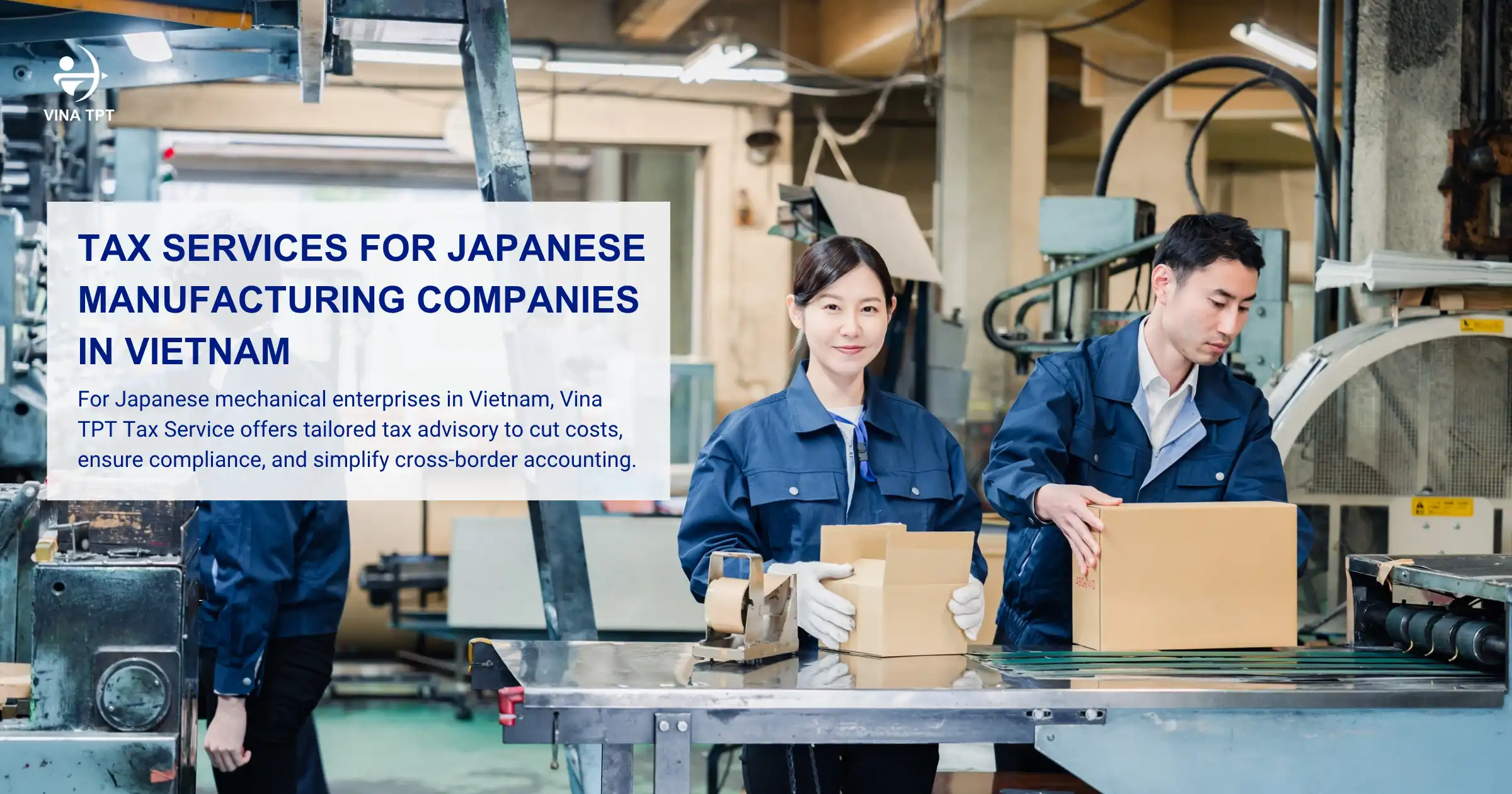1. The Precision of Japanese Manufacturing Meets Vietnam’s Tax Reality
Japanese companies are globally renowned for their “Kaizen” spirit – precision and continuous improvement in production. When expanding their investment to Vietnam, especially in the mechanical engineering and machine manufacturing sector, they bring with them strict standards of quality and efficiency.
However, the tax system in Vietnam has its own characteristics. Regulations on import tax, value-added tax (VAT), or corporate income tax (CIT) all have different calculation methods and declaration deadlines than in Japan. This difference makes tax management and compliance a big challenge, especially when businesses have to simultaneously handle contracts for purchasing components, technology transfer, warranty – maintenance, and research and development (R&D) costs.
Therefore, many Japanese companies have sought specialized tax services in Vietnam to ensure that all financial activities are legal, transparent, and cost-optimized.
2. The Tax Landscape for Mechanical Manufacturers
The mechanical engineering and machinery manufacturing industry is directly affected by many different taxes. Each transaction and each contract has potential risks if not handled properly.
First of all, import tax on components is an important factor, especially for factories importing spare parts from Japan. If the HS code (commodity code) is declared incorrectly, the enterprise may be subject to additional tax or administrative fines. In addition, VAT for industrial products has a rather complicated tax refund and deduction mechanism, requiring accurate accounting for each shipment.
In addition, depreciation of machinery and equipment must comply with the time limit and depreciation method prescribed in Vietnamese accounting standards. For mechanical enterprises, the value of fixed assets is often very large; therefore, even a small error in recording depreciation can affect financial statements and corporate income tax.
Technology transfer, maintenance and warranty costs also need to be recorded at the right time and have valid documents. These are areas where tax advisory services with mechanical expertise can save businesses hundreds of thousands of dollars each year.
3. Typical Compliance Risks
In fact, many Japanese enterprises in Vietnam face common tax risks that are difficult to detect early. One of the biggest risks is inaccurate transfer pricing. When a Vietnamese branch purchases components, equipment or technical services from its parent company in Japan, incorrect pricing can be considered by tax authorities as an act of transferring profits abroad.
Another risk is invalid maintenance and warranty costs due to a lack of clear contracts or insufficient payment documents. In addition, incorrect recording of fixed assets – for example, including leased machinery in the ownership list – also leads to improper tax deductions.
In addition, VAT deduction errors are common in enterprises with many input and output invoices, especially in import and export transactions. These errors can cause enterprises to be subject to tax arrears, late payment penalties, and even affect their reputation with authorities.
This is why mechanical manufacturing companies need specialized tax advisory services to help them identify risks, review accounting processes and ensure compliance with Vietnamese laws.

4. International Tax Services: Bridging Japan and Vietnam
One of the biggest challenges for Japanese businesses in Vietnam is the difference between the two accounting systems. Japan applies J-GAAP or IFRS accounting standards, while Vietnam follows VAS (Vietnamese Accounting Standards).
Therefore, international tax services act as a bridge between the two countries. This service not only helps businesses adjust accounting items to comply with regulations in Vietnam, but also supports reviewing internal contracts with parent companies, ensuring that R&D costs, royalties or technical service fees are recorded reasonably and have transparent documents.
A synchronous accounting system helps Japanese businesses report accurately to both markets, avoiding the situation of “one number, two reports” – both tax risks and loss of reputation with partners.
Thanks to international tax services, Japanese companies can operate in Vietnam with peace of mind while maintaining the same accuracy, transparency and efficiency as when operating at home.
5. Vina TPT’s Role in End-to-End Compliance
In Vietnam, Vina TPT Tax Service is one of the prestigious partners specializing in providing comprehensive solutions from Vietnam tax accounting to processing periodic reports and tax settlement.
The difference of Vina TPT lies in its deep understanding of the mechanical manufacturing industry and Japanese corporate culture. Their consulting team is not only good at tax expertise but also has a “Kaizen mindset” – a spirit of continuous improvement to help businesses operate more effectively every day.
Vina TPT supports businesses at every stage: from setting up the initial accounting system, preparing VAT and corporate income tax reports, to representing them in working with tax authorities when explanations are needed. The close coordination between the two teams – Japanese and Vietnamese – helps businesses not only comply with regulations but also optimize legal profits.
6. From Compliance to Competitiveness
Tax compliance is not only a legal obligation, but also the foundation of competitiveness. When the accounting and tax systems are managed transparently, businesses can easily calculate actual costs, control profits, and make more accurate investment decisions.
In the long term, a solid tax compliance strategy will help Japanese businesses in Vietnam not only avoid legal risks but also build a trustworthy image in the eyes of partners and management agencies.
With the support of Vina TPT Tax Service, that process becomes easier and more effective than ever.
Contact Vina TPT Tax Service now for free consultation on comprehensive tax management solutions.


